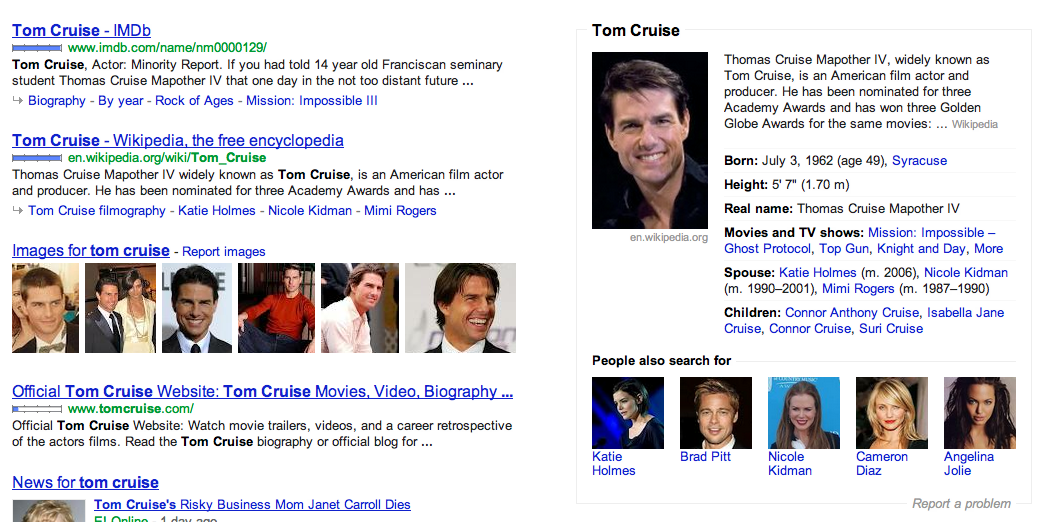You are viewing our site as an Agent, Switch Your View:
Agent | Broker Reset Filters to Default Back to ListGoogle’s Knowledge Graph: The beginning of the end for Real Estate Websites? - Part 1
May 28 2012
 Let me first clarify the title of this post. It could have just as easily included: Movie Websites, Sports Websites, Fashion Websites, Food Websites, and just about any other kind of information site on the internet.
Let me first clarify the title of this post. It could have just as easily included: Movie Websites, Sports Websites, Fashion Websites, Food Websites, and just about any other kind of information site on the internet.
To understand where I am going with this, let me explain what Google's Knowledge Graph actually is.
Since they were created (at least going back to the mid 1990s), search engines have tried to match your search query words to words on web pages. When Alta Vista, early Yahoo, et al tried to do this, their systems were almost immediately--and easily--'gamed.'
Website creators would simply insert the keywords you were searching for on their web page as many times as possible. Some even hid the words on their pages by making the text and background color the same. These tactics became known as "keyword stuffing."
While these early search engines figured the more often these keywords appeared on a page, the more relevant that page was to your query, the fact is they just as often led a query for, say, Britney Spears to web pages about golf. Not a great user experience.
Around the same time Google emerged with what it believed to be a solution to this problem: 'PageRank.'
PageRank basically gave pages a score (ranking) based on the number of incoming links that the web page received from other website pages. Google deemed the action of another site linking to yours as a sort of seal of approval (i.e. thumbs up). Still, it's important to note that this wasn't the only factor Google looked at when ranking a page, but it was certainly at the top of the list.
But over the years, tech savvy individuals learned how to 'game' this system, too. Website creators began doing some less than savory things to get as many 'backlinks' to their sites as possible. Many added tens of thousands of these a day through automated services, thus bumping their pages up in the search results.
These tactics naturally lead to search results that were not based on the best content relative to your search, but instead, who had gamed the system best.
Of course, Google's core product is search. Its business therefore depends on the quality of the results it serves up. Without meaningful results, however, Google (and Bing as well) would lose eyeballs, and revenue sustaining ad dollars along with them.
So Google sprung back into repair mode in April/May of 2011 by introducing updates Panda and then Penguin this April. I won't elaborate on these here, but know that Google's updates (which are ongoing) were implemented to clean up 'web spam' and penalize the gamed sites.
Enter the 'Knowledge Graph'
It's where Google search is going for both desktop and mobile devices. Google made this big announcement on May 16, 2012, but the Facebook IPO eclipsed it, so many people missed it. Google is rolling out the graph slowly across the US and then into other countries shortly after. Here is a link to Google's official release video:
Here's how Google describes the Knowledge Graph:
"When you search, you're not just looking for a webpage. You're looking to get answers, understand concepts, and explore. The next frontier in search is to understand real-world things and the relationships among them."
"So we're building a Knowledge Graph: a huge collection of the people, places and things in the world and how they're connected to one another. This is how we'll be able to tell if your search for "mercury" refers to the planet or the chemical element – and also how we can get you smarter answers to jump start your discovery."

Above is a screen grab of the search results page for Tom Cruise – the Knowledge Box Appears on the right.
So now you're wondering what the heck all this really means to me?
The Knowledge Graph is also known as 'Semantic Search' – a concept that's been around a long time but hasn't gained much traction until Google bought a company deep into the concept called Freebase last year. Google now has the ability to understand the words you're searching for. It no longer tries to match words on a page, but instead gives you results based on the truest meaning of the words in your query.
Google is able to do this by collecting data on a number of elements. For example, it has begun using data to conclusively figure out what other people have "meant" when searching for the same thing (i.e. do more people mean Taj Mahal, the palace or Taj Mahal, the casino?).
Again, the system is looking at what you personally searched for in the past; as in, do you typically search for 'weather in Seattle'? Google is further integrating signals from social networks. (It's mission critical to get on the Google Plus train, folks!)
But probably most important of all (at least relative to this post), Google is using semantic markup language, which basically allows you to give detailed information about specific content on your web site (e.g. a property listing) that can easily be read by a search engine and help them understand the meaning of that specific content.
Check back tomorrow, when Erik Goldhar explains how this relates to "the demise of real estate."









